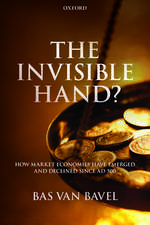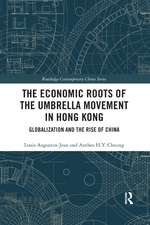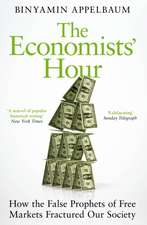Advertising and the European City: Historical Perspectives: Routledge Revivals
Autor Clemens Wischermann, Elliott Shoreen Limba Engleză Paperback – 30 iun 2020
First published in 2000, this volume responds to the rise and spread of advertising throughout Europe and the world in the past one and a half centuries which is breathtaking in its scope and influence, now part of the way we think and live. Historians are only just beginning to understand this process, replacing outmoded theories of manipulation which focused on the advertiser with more sophisticated cultural explanations that centre on the way consumers filter and select messages creating new worlds of perception. The authors of this work find the origins and trace the development of this new world or perception in the modern city: London and Paris, the forerunners, and the cities and larger towns of France, Germany, Belgium and the Netherlands, where advertising created new urban perceptions, leading to new avenues of consumption and altered lifestyles. Advertising is viewed in this work as a new way of perceiving and organising the world of the city-dweller, a visual culture, a way of attaching meaning to things and to words, or rearranging the mental map of modern life.
| Toate formatele și edițiile | Preț | Express |
|---|---|---|
| Paperback (1) | 215.16 lei 6-8 săpt. | |
| Taylor & Francis – 30 iun 2020 | 215.16 lei 6-8 săpt. | |
| Hardback (1) | 627.85 lei 6-8 săpt. | |
| Taylor & Francis – 31 iul 2018 | 627.85 lei 6-8 săpt. |
Din seria Routledge Revivals
-
 Preț: 258.66 lei
Preț: 258.66 lei - 9%
 Preț: 1038.45 lei
Preț: 1038.45 lei - 9%
 Preț: 934.94 lei
Preț: 934.94 lei -
 Preț: 238.40 lei
Preț: 238.40 lei -
 Preț: 294.72 lei
Preț: 294.72 lei -
 Preț: 258.52 lei
Preț: 258.52 lei - 9%
 Preț: 903.41 lei
Preț: 903.41 lei - 18%
 Preț: 695.85 lei
Preț: 695.85 lei -
 Preț: 296.10 lei
Preț: 296.10 lei -
 Preț: 342.36 lei
Preț: 342.36 lei - 9%
 Preț: 764.28 lei
Preț: 764.28 lei -
 Preț: 317.54 lei
Preț: 317.54 lei - 9%
 Preț: 619.48 lei
Preț: 619.48 lei -
 Preț: 258.66 lei
Preț: 258.66 lei -
 Preț: 245.10 lei
Preț: 245.10 lei - 9%
 Preț: 903.80 lei
Preț: 903.80 lei - 9%
 Preț: 832.07 lei
Preț: 832.07 lei -
 Preț: 153.81 lei
Preț: 153.81 lei -
 Preț: 258.66 lei
Preț: 258.66 lei -
 Preț: 294.97 lei
Preț: 294.97 lei -
 Preț: 200.66 lei
Preț: 200.66 lei -
 Preț: 199.85 lei
Preț: 199.85 lei -
 Preț: 308.89 lei
Preț: 308.89 lei -
 Preț: 295.04 lei
Preț: 295.04 lei -
 Preț: 382.23 lei
Preț: 382.23 lei - 9%
 Preț: 606.35 lei
Preț: 606.35 lei -
 Preț: 343.21 lei
Preț: 343.21 lei -
 Preț: 258.66 lei
Preț: 258.66 lei -
 Preț: 230.80 lei
Preț: 230.80 lei - 9%
 Preț: 640.90 lei
Preț: 640.90 lei -
 Preț: 256.94 lei
Preț: 256.94 lei -
 Preț: 257.67 lei
Preț: 257.67 lei - 9%
 Preț: 801.69 lei
Preț: 801.69 lei -
 Preț: 228.88 lei
Preț: 228.88 lei -
 Preț: 259.47 lei
Preț: 259.47 lei -
 Preț: 368.93 lei
Preț: 368.93 lei - 9%
 Preț: 764.34 lei
Preț: 764.34 lei -
 Preț: 246.37 lei
Preț: 246.37 lei -
 Preț: 326.26 lei
Preț: 326.26 lei -
 Preț: 286.98 lei
Preț: 286.98 lei - 8%
 Preț: 432.15 lei
Preț: 432.15 lei -
 Preț: 258.66 lei
Preț: 258.66 lei -
 Preț: 267.15 lei
Preț: 267.15 lei -
 Preț: 295.10 lei
Preț: 295.10 lei -
 Preț: 259.68 lei
Preț: 259.68 lei - 5%
 Preț: 231.22 lei
Preț: 231.22 lei -
 Preț: 339.90 lei
Preț: 339.90 lei -
 Preț: 380.89 lei
Preț: 380.89 lei -
 Preț: 302.13 lei
Preț: 302.13 lei -
 Preț: 294.72 lei
Preț: 294.72 lei
Preț: 215.16 lei
Preț vechi: 258.18 lei
-17% Nou
41.17€ • 43.09$ • 34.27£
Carte tipărită la comandă
Livrare economică 31 martie-14 aprilie
Specificații
ISBN-10: 113860898X
Pagini: 242
Dimensiuni: 156 x 234 x 23 mm
Greutate: 0.41 kg
Ediția:1
Editura: Taylor & Francis
Colecția Routledge
Seria Routledge Revivals
Locul publicării:Oxford, United Kingdom
Cuprins
Recenzii
Descriere
First published in 2000, this volume responds to the rise and spread of advertising throughout Europe and the world in the past one and a half centuries which is breathtaking in its scope and influence, now part of the way we think and live. Historians are only just beginning to understand this process, replacing outmoded theories of manipulation which focused on the advertiser with more sophisticated cultural explanations that centre on the way consumers filter and select messages creating new worlds of perception. The authors of this work find the origins and trace the development of this new world or perception in the modern city: London and Paris, the forerunners, and the cities and larger towns of France, Germany, Belgium and the Netherlands, where advertising created new urban perceptions, leading to new avenues of consumption and altered lifestyles. Advertising is viewed in this work as a new way of perceiving and organising the world of the city-dweller, a visual culture, a way of attaching meaning to things and to words, or rearranging the mental map of modern life.















![Teach Your Kids about Countries [Vol 18]](https://i3.books-express.ro/bt/9781480268333/teach-your-kids-about-countries-vol-18.jpg)





